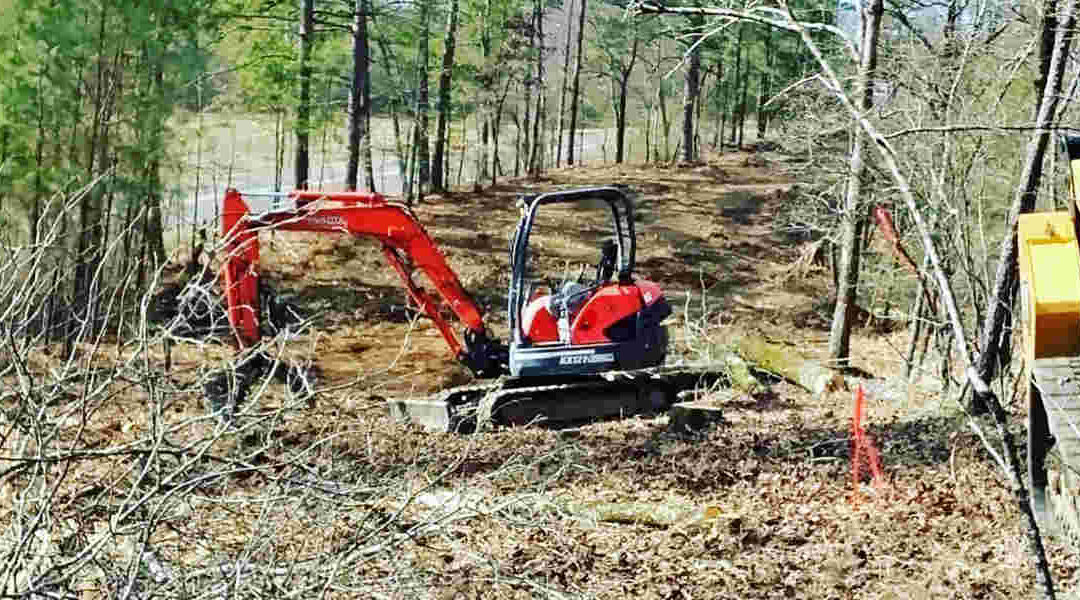When you’re ready to put tools to ground (or hire someone to do so for you), it can be exciting as you build your dream home from scratch or add a pool, porch, or garage to your existing one. However, before renting that bulldozer or laying bricks, professional excavations are crucial for preparing the land.
Our ISA-certified tree arborists provide the most reliable tree services in Magnet Cove, AR. So, trust us to explain why excavation projects are necessary and the different types you may come across.
Leveling Your Land With Grading Techniques
As you can probably assume, your soon-to-be home, garage, or barn needs to sit on leveled grounds to eliminate the chances of tilting or slanting upon completion. A professional should also remove obstacles like boulders before laying the foundation since the debris can threaten it. So, when grading land, excavators help to set the ideal groundwork for engineers and construction workers.
The excavation contractors first clear the land, chopping trees, shrubs, and other brush before hauling them away. The team then removes rocks and boulders during these professional excavations. Finally, soil removal or shifting helps them to raise or lower the elevation and get rid of unnecessary slopes.
However, before finishing their part, the excavators perform site assessments to determine the soil condition and stability. Without it, it would be difficult for them to tell if the land can support heavy machinery and new builds without caving in. So, site assessments help guarantee workers’ safety and timely projects while pinpointing:
- Underground power, water, or gas lines
- Contaminated soil and other hazardous materials
- Buried debris
Other Types of Excavation Projects and Their Benefits
While land grading is common in residential and business builds, other excavations exist for site preparation, depending on the site location and what needs doing.
Trenching for Lines and Cables
Trenching is another common type of excavation, but unlike grading, it comprises digging long, thin pathways a few feet into the ground. These cuts help excavators lay gas and water lines, power cables, and more. However, construction workers may also use them as trench footing that they fill with concrete if the soil is not sturdy enough and they need further support for the structure above.
Drilling To Install Property Systems
Professional excavations also include drilling, where construction workers use drilling rigs and explosives to create a hole in the ground and clear away abounding debris. Excavators usually drill to extract oil and gas, but many home and business owners can utilize this method on their properties when introducing:
- Freshwater wells
- Underground heating systems
- Pools and hot tubs
Tunneling for Underground Transportation
Tunneling may not be as popular among residents and business owners, but it’s still an earthmoving excavation method worth mentioning. By utilizing tunnel-boring machines and explosives, excavators create an underground pathway that, unlike trenching, you cannot see from ground level. Many cities use this method when building railways and roads underground.
Dredging Underwater
Dredging is different from the other excavation methods on our list since it comprises clearing underwater areas with barges, backhoes, and draglines. These machines scrape the murky floors in lakes, rivers, oceans, and other bodies of water, removing sediments that bar water navigation. This method also increases water quality in some areas, prevents flooding, and restores ecosystems.
Clearing Your Property Without Cutting Corners!
Getting your land just right before a big build makes all the difference in the completed project. For a team of experts who provide professional excavations without hiccups, call Urban Jacks Tree Service at (501) 494-1363. We’ll provide a free estimate when you contact us in Magnet Cove, Arkansas, today!

